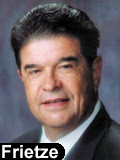 Las Cruces City Councilor Jose Frietze filed a motion today asking for the dismissal of an ethics complaint against him, alleging that “it raises unfounded, unsubstantiated and frivolous charges” that amount to “willful misuse of the entire process for publicity and political gain.”
Las Cruces City Councilor Jose Frietze filed a motion today asking for the dismissal of an ethics complaint against him, alleging that “it raises unfounded, unsubstantiated and frivolous charges” that amount to “willful misuse of the entire process for publicity and political gain.”
It’s not immediately clear how the motion will be handled. The city’s code of ethics requires that complaints remain confidential unless there’s a determination that something improper was done, but this complaint was made public soon after it was filed.
That’s part of the reason the complaint must be dismissed, Frietze’s attorney, Joseph Holmes of
“The code of ethics specifically states that the purpose of the code and the complaint procedures is to protect ‘against the raising of unfounded, unsubstantiated or frivolous charges on unethical behavior,’” Holmes’ motion states. “… The failure to dismiss the complaint immediately will facilitate and encourage the filing of future frivolous charges or lead to other instances of ‘dirty pool’ politics.”
Las Crucen Jackye Meinecke filed the complaint on Oct. 17 alleging that Frietze violated the city ethics code by failing to disclose land transactions between his non-profit and a
The complaint comes as the Nov. 6 election approaches, and Frietze is facing three challengers. The developer who gave land to Frietze’s non-profit, Philip Philippou, is a controversial topic in the election because the council approved in May a 6,000-acre Philippou development that could add 30,000 homes to
Complainant says there’s no political motivation
Meinecke could not immediately be reached for comment. In an interview last week, she said she does believe the city’s growth is out of control, but said her motive isn’t political. She said she filed the complaint as soon as she learned that Frietze had failed to disclose several land transactions between his non-profit and Philippou that have occurred since 2005, a time in which the council voted on several Philippou developments.
“For other people, it probably is exactly about (the election), but for me, it is about this whole idea that he should have disclosed this,” Meinecke said last week. “All he had to do was disclose it. We’re not saying that it was wrong, or he couldn’t do it.”
At issue are two provisions in the city’s ethics code. The first states that a conflict of interest exists when an official’s personal interests conflict with public duties or “when, to a reasonable person, it would appear that the actions of a public official are partial, biased or otherwise compromised due to the public official’s private interests or personal gain being in conflict with the public interest.”
The second provision states that an official should disclose any situation that could be a conflict of interest, “be it real, potential, perceived or alleged,” during a pubic meeting of the city council. It’s then up to the council to decide whether the official can participate in discussion or a vote on the agenda item in question.
Attorney says there is no ethics violation
But Holmes wrote that there is no violation of the ethics code and that the complaint fails to even allege “that Councilor Frietze has personally benefited or profited from any of the transactions reported.” In addition, he wrote, “there is no surreptitious or secretive plan. All of the transactions complained of are recorded in the public records of
Holmes alleges that the timing of the complaint was calculated by Meinecke and others so that “dismissal of the unfounded allegations will likely take place after the election.”
The code of ethics requires that complaints, once filed, be considered by an independent attorney. If that attorney finds grounds to proceed, a board will be formed to consider the complaint. Only that board finds a violation and asks the city council to consider it does the code state that the complaint should become public.
Frietze said in an interview that the process is intended to screen out complaints that have no basis so they can’t be used as political weapons. He called Meinecke’s complaint and her alleged release of it to the newspaper “an unethical use of the ethics code.”
“I found out a complaint had been filed from the Sun-News,” Frietze said. “I’m being tried in the media. I’m being judged in the media, and I haven’t had a chance to present my side of the story.”
Frietze also said people are “smart enough to see through this” and it “has encouraged the people who are helping me on my campaign, so it may have backfired.”
If the complaint isn’t dismissed, Holmes’ motion requests that the city require an immediate deposition, under oath, for Meinecke, and an order that she preserve all documents, phone records and electronic communications related to the complaint. Frietze said that would prove the political motives behind the complaint.
What happens next is unclear. Frietze provided me a copy of the motion after the clerk’s office had closed for the day, so I couldn’t seek comment. In addition, because of the confidentiality provision, it’s not clear that the clerk would speak publicly about the situation even if I had been able to reach her for comment.